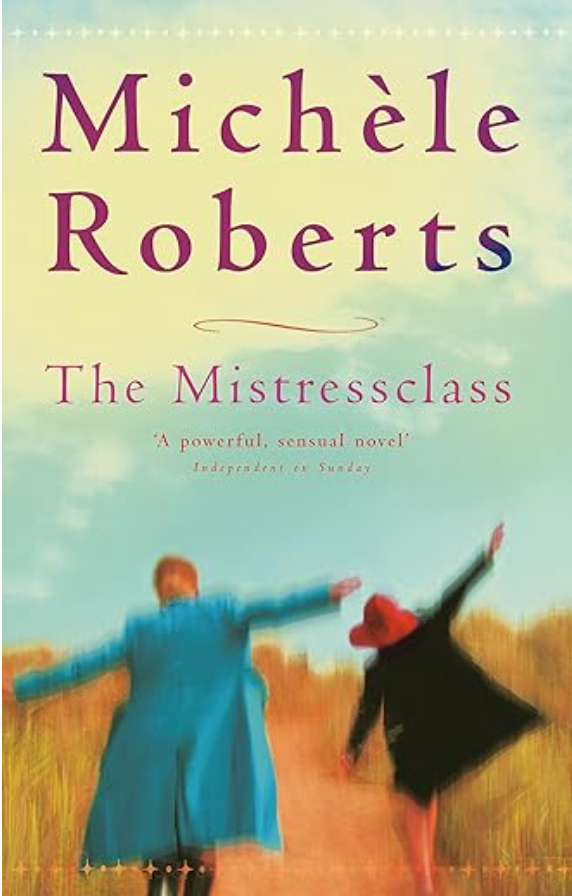
by Bernie Goldbach in Kilkenny
I have four book sellers to choose from in the city of Kilkenny. Their shops have a steady stream of people selecting Christmas gifts and holiday reading materials. I went looking for The Mistressclass but had to settle for ordering it online because Michele Roberts isn’t on the shelves in Kilkenny. Her perspective about books delights me.
She writes:
Bookcases in my childhood, were little houses people by books. Books were alive, and spoke to me. Sharing a bedroom with my two sisters, I found a room of my own in the bookcase. I found heroes and monsters, sexy villians, fearless girls. At the same time bookcases were doors. They swung open, and you stepped through, into the mysterious land beyond, and you left home and did not know if you’d ever come back.
The dark pine bookcase, glass-doored and pedimented, that stood in the front room, belonged to my mother. Grandpere had it made for her when she left home to go to university. Now she shared it with my father: their joint house in which their books cohabitated, spoke in different languages, flirted and teased. My mother loved Moliere, had mixed feelings about the nouveau roman, recounted with pleasure how she’d loathed Diderot’s La Religeuse that when she finished it she hurled it across the room. Dad’s eclectic lot included Somerset Maugham rubbing shoulders with Dornford Yates, Arnold Bennett, Winston Churchill.
The local library kept me going. I’d read everything on the primary school bookshelves by the age of 10, and had been put on to the Old Testament to slow me down a bit. I started using the adult library the same year. I read Lolita and didn’t know how to cope with the sexy feelings it gave me. I gobbled collections of folk tales. One Indian story told of a hero who so loved his paramour that when she had to pick him out from a hall of indistinguishable heroes, lookalikes in gold armour, he cut off his little finger so she would know and choose him. Blimey. Did mem really want women to love them that much?
Sex and the imagination fed each other. A mixed-up teenager, on one level I was a repressed, guilty, Catholic child convinced she had a vocation to join the Carmelites, hardly ever speak, read for only half an hour every day. At the same time, I dreamed of living in Paris amid opium-taking artists and writing great love poetry. Sister Bonaventure, who ran the convent school library and spent her free time sticking black labels over the genitalia featured in the art books, counselled experiencing the world before giving it up forever. I raced off to university where you could read books all day long. I specialised in medieval literature and encountered an ancient female literary tradition: mystics, poets, playwrights, heretics. Standing on the steps outside the college library, my arms full of books, I felt my vocation drop away, quickly followed by my religious faith. So that was that, I thought: I’m an atheist now. Easy-peasy. Years later I discovered that the split between body and soul, body and mind, which so damaged my adolescence, would, of necessity, become a theme for my writing, force me to become obsessed with form. Trying to repair the damage you invent new shapes: you have to.
Writers need day jobs. I trained as a librarian. In classification classes I learned that the Dewey decimal system, used in all British public libraries, placed women under sociology, alongside lunatics and gypsies. For my dissertation, I designed a new system, which put women at the centre of the world, and allowed us to be related to anything we chose, lunatics, gypsies and men included. I spent a year in the British library as their library student. I learned to catalogue 17th-century books, which involved understanding how they were made physically, how type was set, how printed sheets were folded and gathered. I could roam the circular bookstacks, swing them back, vanish behind them. In one such secret den I learned about bookbinding; in another, about early newspapers. To get at the collection of pornography, kept in a locked case, you had to have special permission. I didn’t survive long as a librarian, though; too much admin and not enough time to bury myself in books.
Funny how some people think libraries are obsolete. To me, they are places pulsing with passion and life. The past comes leaping back, leaping up out of books. Dead writers aren’t really dead; just pretending. They talk to us and we talk back.
Michele Roberts – The Mistressclass ISBN 0805074406 should be in Dervala Hanley’s Amazon Wish List.